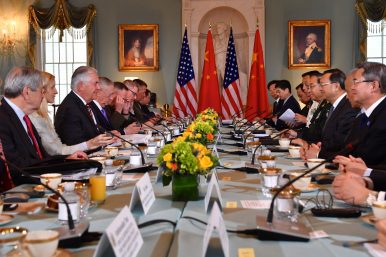By Shannon Tiezzi
 China has pulled out of the next round of ministerial-level talks with the United States, underscoring the continued deterioration of the relationship. From the trade war to the U.S. conception of China as a “strategic competitor,” frictions are building on nearly every front of the relationship.
China has pulled out of the next round of ministerial-level talks with the United States, underscoring the continued deterioration of the relationship. From the trade war to the U.S. conception of China as a “strategic competitor,” frictions are building on nearly every front of the relationship.
After the United States imposed tariffs on China’s Equipment Development Department over the purchase of Russian military technology, China cut short a visit to the United States by People’s Liberation Army Navy chief Shen Jinlong and postponed a late September meeting between the joint staff departments of the two countries’ militaries. Last week, China also rejected a U.S. request to make a port call in Hong Kong after Washington approved its latest arms sale to Taiwan.
“[T]he U.S. side should bear full responsibility for the recent impact on the China-US mil-mil relationship,” Chinese Defense Ministry spokesperson Ren Guoqiang said in the ministry’s monthly press conference in September.
In the most recent move, China has cancelled the Diplomatic and Security Dialogue, one of four main pillars for U.S.-China talks under the Trump administration. U.S. Secretary of Defense Jim Mattis had been scheduled to travel to Beijing for the talks in mid-October, but China will not make a senior military official available for the meeting, according to the New York Times.
The Diplomatic and Security Dialogue brings the U.S. secretaries of state and defense together with high-level diplomatic and military officials from China. Last year, the talks were chaired by Mattis and then-Secretary of State Rex Tillerson for the United States, and then-State Councilor Yang Jiechi and then-Central Military Commission member Fang Fenghui for China. Since then, Tillerson has been replaced, Yang has been promoted, and Fang has been purged.
U.S.-China military exchanges have a long history of being sacrificed due to tensions in the broader relationship. Back in 2009, then-U.S. Secretary of Defense Robert Gates complained of the “on-again, off-again”nature of the military-to-military relationship. “[W]e make strides, we have a good visit, we agree to cooperate on certain things and then there will be a hiccup that will cause there to be a suspension,” the Pentagon press secretary at the time elaborated. Ironically, the very next year, in 2010, China severed all military contact with the United States for nearly a year, in response to a U.S. military sale to Taiwan.
Nearly 10 years later, that “on-again, off-again” pattern remains the norm. The difference is that military and security exchanges are no longer the only aspect of ties under siege. In today’s U.S.-China relationship, dialogue and talks in all fields are being impacted.
When Trump came to office, his administration reconfigured the previous Strategic and Economic Dialogue with China into four separate talks: the Diplomatic and Security Dialogue, the Comprehensive Economic Dialogue, the Law Enforcement and Cybersecurity Dialogue, and the Social and Cultural Dialogue. Each of these dialogues, originally envisioned as annual events, has been held once to date. The Comprehensive Economic Dialogue was effectively declared dead by the Trump administration in November 2017 and now the Diplomatic and Security Dialogue has been derailed. Both the Law Enforcement and Cybersecurity Dialogue (last held on October 4, 2017) and Social and Cultural Dialogue (last held September 28, 2017) are due for the next installment but it’s hard to imagine either taking place under the current atmosphere.
Things will likely get worse before they get better. U.S. Vice President Mike Pence is supposed to give a speech this week at the Hudson Institute detailing Chinese efforts to influence American politics, as well as other behavior from Beijing that Washington disapproves of. China will have a stern response at the ready.
No comments:
Post a Comment